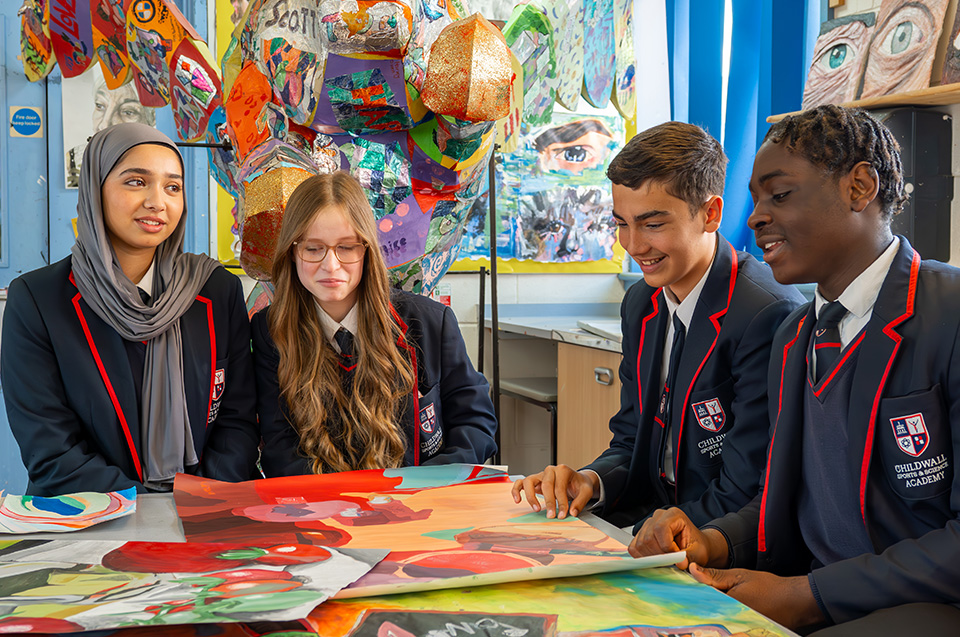Spiritual, Moral, Social and Cultural and Personal Development
Personal Development and SMSC is a key element of the whole school curriculum at Childwall Sports and Science Academy. Personal Development is embedded well within the ethos of the academy and continues to develop in line with local, national and global changes to our society and the environment in which we live and learn. The Personal Development programme is delivered through assemblies, form time, PSHE and RE lessons, extra- curricular activities and through curriculum content. The academy works to enhance student’s spiritual, moral, social and cultural development. The programme supports the development of resilience, independence, cultural capital and character. The academy aims to ensure children become valuable and fully rounded members of society who treat others with respect and acceptance, regardless of background, religion, sexuality, gender or race.
Childwall SSA aims to promote the basic British Values of democracy, the rule of law, individual liberty, and mutual respect and acceptance for those of different faiths and beliefs. We ensure our young people understand the importance of respect, equality, diversity, leave school fully prepared for life in modern Britain and can make a positive contribution to society. Our careers programme helps prepare students for future success in education, employment and training. The academy has strong links with local and national organisations such as Stonewall, Diversity Role Models, The Anthony Walker Foundation, Brook, The Amy Winehouse Foundation and Everton in the Community, that support our students with making the right choices to keep safe and celebrate the differences and diversity within British society.

Personal Development is facilitated by the use of the following systems, processes and partnerships at CSSA:
- An assembly and form time programmed linked to our Engage, Enable and Empower mission statement, British Values and UNICEF Rights Respect in Schools. This gives students the opportunity to reflect, discuss, debate and explore SMSC concepts, themes and values.
- The Academy achieved UNICEF Rights Respect in Schools award level One. We are currently working towards achieving our gold award.
- Tackling bullying, aggression, discrimination and derogatory language through assemblies, form time and partnerships with outside organisations such as Diversity Role Models, Stonewall, Armistead Foundation, Anthony Walker Trust and EMTAS. The academy works hard to promote equality and diversity. Student voice states this is a strength. We have also designed and implemented a set of form time activities in order for students to understand what these terms mean and they can discuss and articulate their views.
- There is a full PSHE and RE curriculum supported by outside organisations. This includes looking at world religions, age appropriate sex and relationship education, mental and physical health and how to keep safe. We have listened to student voice and religious festivals are now included into assemblies, RE curriculum and form time activities.
- SMSC and British Values opportunities within our curriculum areas. The majority of programmes of study have SMSC strands running through them. They are also part of all assemblies and form time activities in order to make sure important messages are repeated to the whole Childwall community.
- Our close working partnerships with cultural organisations such as The Liverpool Biennial, National Museums Liverpool, Handstand Film Company and the local artists to deliver a strong cultural offer for our school community. These partnerships give all students access to the excellent Cultural Capital opportunities we have within Liverpool.
- The ‘World in One School Festival’ that gives all KS3 students the chance to work alongside performers, musicians, artists and designers in order to recognise and extend their own interests and strengths whilst raising their aspirations.
- Improving the school environment through the use of our visual arts is ongoing and much of the school has been repainted. There is a new display area being created in the LRC and boards being placed in the main corridor in order to celebrate and display the work of our students.
- An extensive extra-curricular programme that is inclusive to all students.
- Duke of Edinburgh Award, Bronze to Gold – developing character, confidence, resilience and independence.
- Student Council/Student Leaders and Student Voice. Contributing to society, the academy and local community and becoming active confident citizens.
- Charity fundraising led by both staff and students.
British Values
These are defined by Ofsted as:
Democracy
The rule of law
Individual liberty
Mutual respect
Acceptance of those with different faiths and beliefs
What is spiritual, moral, social and cultural development?
SPIRITUAL – Beliefs, religious or otherwise, which inform pupils’ perspective on life and their interest in, and respect of, different people’s feelings and values. A sense of enjoyment and fascination in learning about themselves, others and the world around them, including the intangible. Use of imagination and creativity in their learning and willingness to reflect on their experiences.
MORAL – Ability to recognise the difference between right and wrong and pupils’ readiness to apply this understanding in their own lives. Understanding of the consequences of their actions. Interest in investigating and offering reasoned views about moral and ethical issues.
SOCIAL – Use of a range of social skills in different contexts, including working and socialising with pupils from different religious, ethnic and socioeconomic backgrounds. Willingness to participate in a variety of social settings, cooperating well with others and being able to resolve conflicts effectively. Interest in, and understanding of, the way communities and societies function at a variety of levels.
CULTURAL – Understanding and having an appreciation of the wide range of cultural influences that have shaped their own heritage. Willingness to participate in, and respond to, for example, artistic, musical, sporting, mathematical, technological, scientific and cultural opportunities. Interest in exploring, understanding of, and respect for, cultural diversity and the extent to which they understand, accept, respect and celebrate diversity, as shown by their attitudes towards different religious, ethnic and socioeconomic groups in the local, national and global communities





